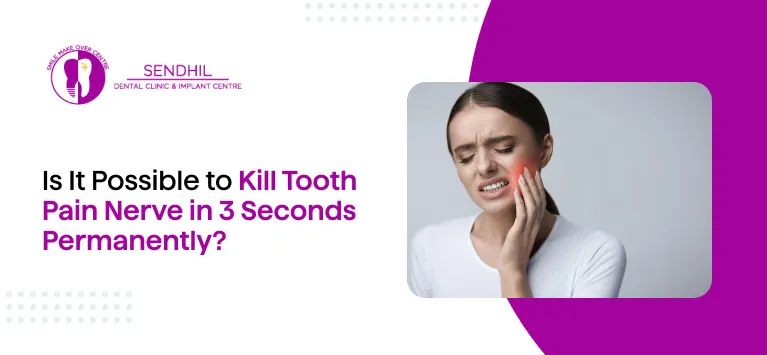
Is It Possible to Kill Tooth Pain Nerve in 3 Seconds Permanently?
Tooth pain is one of the worst kinds of pain, and if you’ve been looking for fast solutions, you may have come across a claim that says you can kill tooth pain nerve in 3 seconds permanently. While that sounds like a quick fix, the answer is simple: No, it is not possible to kill tooth nerve pain in 3 seconds permanently.
Issues like decay or infection usually cause tooth nerve pain, and fixing the root cause takes time and professional dental care. However, understanding the causes, prevention tips, and treatment options can help you manage and avoid tooth pain effectively.
Table of Contents
What Causes Tooth Nerve Pain?
Tooth nerve pain happens when the inner layer of your tooth, called the pulp, is damaged or irritated. The pulp contains nerves and blood vessels, and when it’s affected, it can cause sharp or throbbing pain. Common causes include:
- Cavities: Deep cavities expose the tooth nerve, causing sensitivity and pain.
- Tooth Decay: Untreated decay can reach the pulp, leading to nerve pain.
- Gum Infections: Infected gums can spread to the tooth root, irritating the nerve.
- Tooth Injury: A cracked or broken tooth can expose or damage the nerve.
- Bruxism (Teeth Grinding): Grinding your teeth can wear down the enamel, causing nerve pain.
Why Can’t You Kill Tooth Pain Nerve in 3 Seconds?
It would be great if we could instantly stop tooth pain, but unfortunately, no home remedy or trick can get rid of tooth nerve pain permanently in just 3 seconds. The nerve inside your tooth is what causes the pain when it is damaged or infected.
While there are some home treatments for tooth nerve pain to make the pain feel better for a short time, you still need proper treatment to fix the problem. The pain may go away for a bit, but it will likely return unless the issue causing the pain is treated by a dentist.
How to Reduce Tooth Nerve Pain at Home
Even though you can’t kill tooth pain nerve in 3 seconds permanently at home, there are ways to manage the pain until you can see a dentist. For permanent relief from tooth nerve pain, it’s essential to consult your dentist. However, there are temporary pain relief home remedies for killing nerve in tooth and natural antibiotics for tooth infections that can help ease the pain. We’ve outlined these techniques for you here.
Cold Compress
A cold compress can numb the area and reduce swelling. Wrap some ice in a cloth or use a frozen gel pack, then hold it on your face where the pain is. This can help the pain go away for a short time.
Clove Oil
Clove oil is a natural remedy that has been used for tooth pain for years. It contains eugenol, which numbs the pain. You can apply a small amount of clove oil to a cotton ball and place it on your tooth for some quick relief.
Salt Water Rinse
Rinsing your mouth with warm salt water can help reduce inflammation and clean out bacteria. Mix a teaspoon of salt in warm water, then swish it around your mouth for 30 seconds. This can make the pain feel better for a while.
Peppermint Tea Bags
Used peppermint tea bags can help with tooth pain. They have a cooling effect that can numb the pain. After brewing a tea bag, let it cool down, then place it on the sore tooth. It can bring temporary relief.
Pain Relievers
Pain relievers can help reduce the pain. You can find these at most stores or pharmacies. They won’t fix the problem, but they will help you feel better for a while.
Desensitizing Toothpaste
If exposed tooth nerves are causing pain, using desensitizing toothpaste can help. These products contain ingredients that block pain signals from the nerve endings. However, they require consistent use over a few weeks to show noticeable results in relieving dental nerve pain. Studies have also shown that desensitizing toothpaste effectively reduces dentin hypersensitivity.
In addition, avoiding hot, cold, acidic, or spicy foods and beverages can help prevent further irritation and reduce pain.
Permanent Methods to Kill Tooth Pain Nerve
Root Canal Treatment
The most effective and permanent way to kill a tooth nerve is through a root canal procedure. This involves:
- Removing the infected or damaged pulp containing the nerve.
- Cleaning and disinfecting the tooth’s interior.
- Sealing the tooth to prevent future infections.
Benefits:
- Saves the natural tooth.
- Eliminates nerve pain permanently.
Drawbacks:
- Slight discomfort during the procedure.
- Relatively expensive.
This method ensures you can kill tooth pain nerve in 3 seconds permanently during the procedure, offering instant and lasting relief.
Tooth Extraction
In severe cases where the tooth cannot be saved, tooth extraction may be the best option. This procedure involves:
- Removing the entire tooth, including the root and nerve.
- Replacing it with an implant or bridge if needed.
Benefits:
- Immediate relief from nerve pain.
- Prevents the spread of infection.
Drawbacks:
- Loss of natural tooth.
- Additional procedures for replacement.
Dental Nerve Ablation
This advanced method involves using lasers or chemical agents to target and destroy the tooth nerve without removing the tooth. Dentists may use this as an alternative to traditional procedures.
Benefits:
- Minimally invasive.
- Quick recovery.
Drawbacks:
- Not suitable for all cases.
- It may require follow-up treatments.
Debunking the Myth: Can You Kill Tooth Nerve in 3 Seconds Permanently?
Some people claim that you can kill tooth pain nerves in 3 seconds permanently using home remedies or tricks. But this is not true. Even though some remedies, like clove oil or saltwater rinses, can help reduce pain for a little while, they can’t permanently fix the nerve or address the problem causing the pain.
How to Relieve Tooth Nerve Pain: The Bottom Line
There’s no way to kill tooth pain nerve permanently in just 3 seconds. While temporary remedies like cold compresses, clove oil, and desensitizing toothpaste can provide short-term relief, they do not address the root cause. Permanent solutions, such as root canal treatment or tooth extraction, require professional dental care.
It’s important to consult a dentist to treat the underlying issue and prevent further complications. Following good oral hygiene practices and avoiding triggers like extremely hot or cold foods can also help manage and reduce the chances of tooth nerve pain.




